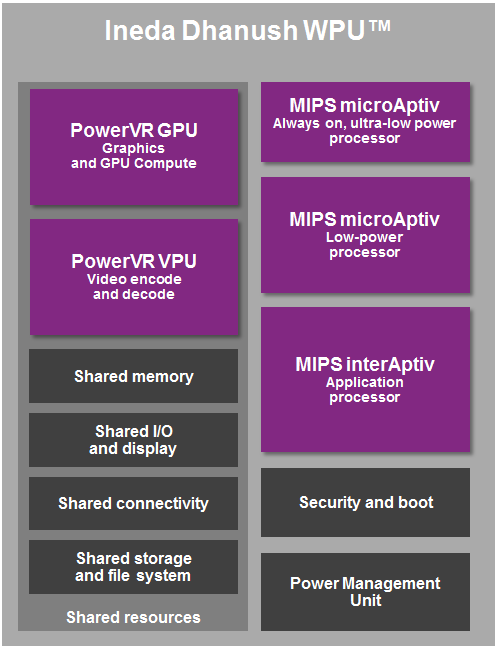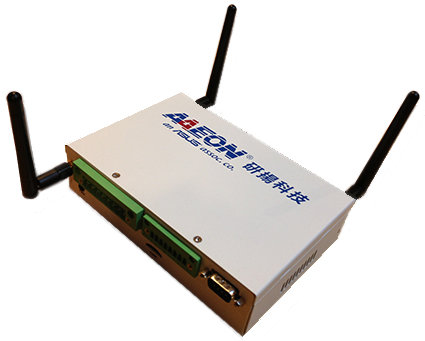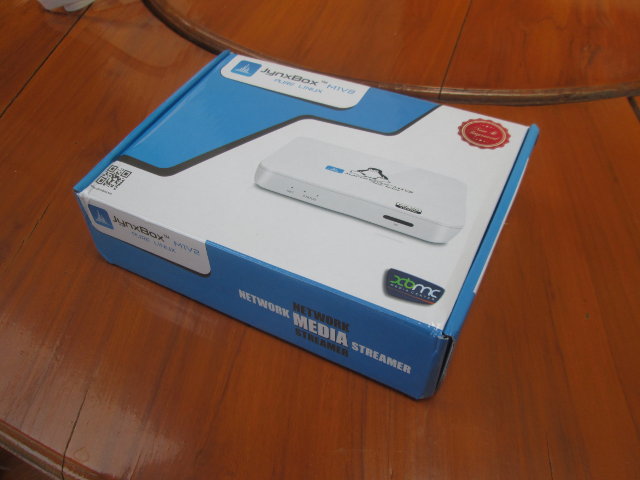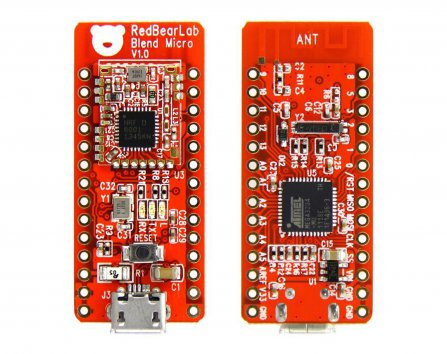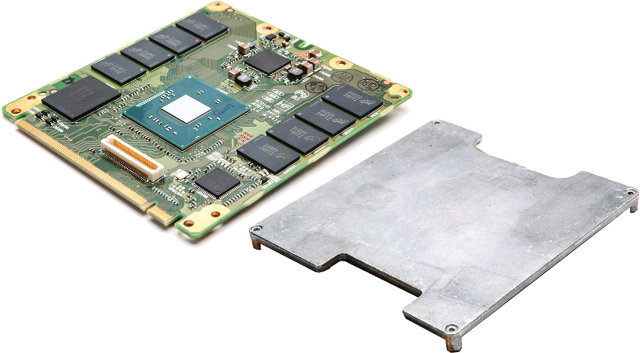What’s a WPU? It stands for Wearable Processor Unit, and as you may guess it’s a processor specifically designed to be used in wearables such as smartwatches or fitness trackers. Currently, many wearables are based on application processors that are used in smartphones (e.g. Galaxy Gear), and lower-end versions are based on standard low power MCUs (e.g. Pebble), but none of them are actually based on SoC specifically designed for wearables, and analysts are asserting that new types of SoC are definitely needed if companies are to provide wearables with the battery life and features consumers want. Ineda Systems Dhanush WPU is not the first Wearable SoC announced, as for instance AllWinner mentioned their WX quad-core SoC for Wearables should become available in Q4 2014 in their roadmap, and Mediatek vaguely unveiled their Aster SoC at CES 2014, but it’s the first that I know of where we’ve got most of the […]
Aaeon AIOT-X1000 Linux Gateway is Powered by an Intel Quark SoC
Intel Quark SoC for low power embedded devices has been seen on platforms designed by Intel themselves, such as Intel Galileo board or Edison wearable development kit, but I had not found Quark SoC in actual products until Aaeon announced their AIOT-X1000 gateway for the internet of things running Linux on an Intel Quark X1000 SoC, and working with a Cloud Service by Asus, Aaeon’s parent company. The solution targets manufacturing, transportation, and energy applications. Aaeon AIOT-X1000 specifications: Processor – Intel Quark X1000-series SoCs @ up to 400 MHz System Memory – 1GB DDR3 800/1066 SODIMM Storage – IDE port, and micro SD slot Connectivity – 10/100M Ethernet USB 4x USB2.0 ports Serial – 1x RS-232/422/485, 1x RS-422/485 Other I/Os — I2C, GPIO, JTAG Mini-PCIe card expansion – 1x full-size and 1x half-size, allowing for WiFi, 2G/3G/LTE cellular, Bluetooth, CAN bus, ZigBee, and RFID add-on boards Power – 5V or 9-24V DC input Dimensions – 146 x […]
Cavium ThunderX Server SoC Features up to 48 ARM 64-bit Cores
ARM SBSA specification for server supports up to 268,435,456 CPU cores for the second level of standardization on one or a combination of SoCs. We’re not quite up there just yet, but Cavium ThunderX is an ARM server SoC with up to 48 cores on a single chip, which is the highest number of cores I’ve ever heard of in an ARM SoC. The company created their own custom processor cores using an ARMv8 architecture license, designing an SoC complies with ARM’s Server Base System Architecture (SBSA) standard with the following key features: ARM based SoC that scales up from 8 to 48 cores with up to 2.5 GHz core frequency with 78K I-Cache, 32K D-Cache, and 16MB L2 cache. Fully cache coherent across dual sockets using Cavium Coherent Processor Interconnect (CCPI) Integrated I/O capacity with 100s of Gigabits of I/O bandwidth 4x DDR3/4 72-bit memory controllers supporting up to 1TB RAM […]
Jynxbox M1V2 Pure Linux XBMC Media Player Review
Theaterinabox.tv has sent me Jynxbox M1V2 TV box running XBMC Linux Gotham 13.0, and powered by Amlogic AML8726-M3 processor @ 1 GHz with 2GB Flash and 1 GB RAM. This is an upgrade of the first version featuring AML872-M1 and 512 MB RAM. I’ll go through the specs first, then show some unboxing pictures and video, and complete this post by reviewing the device by playing videos from the network and a USB flash drive, as well as going through the available add-ons in a video review. Jynxbox M1V2/M1+ Specifications Here are the specifications listed for Jynxbox M1V2 Pure Linux, aka Jynxbox M1+: SoC – Amlogic AML8726-M3 @ 1GHz with Mali-400 GPU System Memory – 1GB RAM Storage – 2GB NAND flash + micro SD card reader (up to 32GB) Video & Audio Output – HDMI up to 1080p (default: 720p) Video Codecs & Containers- MPEG 1/2/4, H.264, X264, VC-1, WMV, M2TS, TS, RMVB, […]
Blend Micro Arduino Board Integrates Bluetooth 4.0 Low Energy Connectivity for 25 Euros
RedBearLab’s Blend Micro is an Arduino compatible board with Bluetooth 4.0 Low Enery (aka Bluetooth Smart) connectivity, that’s part of Arduino-at-heart, a partner program initiated by the developers of Arduino boards. It has been made to help design low power Internet-Of-Things (IoT) projects quickly and easily. Blend Micro technical specifications: MCU – Atmel ATmega32u4 @ 8 MHz with 32KB flash (4KB used by bootloader), 2.5 KB SRAM, and 1KB EEPROM. Connectivity – Bluetooth 4.0 Low Energy via Nordic nRF8001 chip USB – 1x micro USB port I/Os: Serial (Tx/Rx) I2C, SPI PWM U to 16 Digital I/Os Up to 6 Analog inputs Operating Voltage – 3.3V Input Voltage – 5V (USB), and 3.3-12V (VIN) Power Consumption – 2mA (average – using Interrupt mode) Dimensions – 43.6 x 18.4 x 4.3mm Weight – 4g The specs are very similar to BLEDuino, except it’s slightly smaller. Blend Micro can communicate with BLE […]
Intel Unveils In-Vehicle Solutions and Development Kit for Assisted Driving and Autonomous Cars
Intel has announced their In-Vehicle Solutions (IIVS) for automakers comprised of hardware based on Intel’s industrial Bay Trail Atom 3800 series SoC, and software solutions relying on a Linux based operating system but it’s not clear whether it might be Wind River Linux, Tizen IVI, or another new OS. The solutions will first provide In Vehicle Infotainment (IVI) with assisted driving features such as , and over time it will allow semi-autonomous and self-driving cards. At the heart of the system, Intel will provide CM1050 computer-on-module that will be part of a development kit including a chassis with CAN, Ethernet, and USB ports, as well as audio and CVBS multimedia I/Os, and radios and antennas for FM, AM, DAB, GPS, WiFi, Bluetooth, and cellular. A Blu-ray drive, and SSDs will be available as storage options. The complete system is designed to be upgradeable, and automakers can expected modules with faster […]
AsiaRF AWM002 Wi-Fi Module and a Tiny IoT Server Kit Get Crowdfunded for $15 and Up
VoCore Wi-Fi module selling for $15 to $20, and it’s corresponding VoCore Dock with Ethernet has been quite popular, and at the time of writing, the project has already received $40,000 in funding with 50 more days to go. But if you’d rather get something for the same price, a few months early, and an already FCC/CE certified and proven module and tiny IoT server, AsiaRF has also launched a crowdfunding campaign for their AWM002 Wi-Fi module running OpenWRT on the same Ralink RT5350 found on the VoCore. as well as AWM002 Tiny Kit which adds Ethernet and USB, and a larger board with easier access to all ports and I/Os. As a reminder, let’s go through AWM002 specifications again: SoC – Mediatek/Ralink RT5350 MIPS 74KEc core @ 360 MHz dual band 802.11n Wi-Fi with data Rate up to 150Mbps, hardware NAT, QoS, TCP/UDP/IP checksum offloading. System Memory – 32 MB Storage […]
Linaro 14.05 Released with Linux Kernel 3.15, Android 4.4.2, and Ubuntu Trusty
Linaro 14.05 has been released with Linux Kernel 3.15-rc5 (baseline), Linux Kernel 3.10.40 (LSK), Android 4.4.2, and Ubuntu has been switched from Saucy to Trusty. More work has been done on big.LITTLE processing and ARMv8 support with notably completing bootstrapping with Debian 64-bit. New hardware platform have started to pop-up such as TI J6-Vayu which must be an evaluation board for Texas Instruments Jacinto 6 dual core Cortex A15 SoC for automotive application, as well as IFC6410, a Snapdragon 600 development board which got a Ubuntu LEB image. This month also marks the first release of Linaro GCC 4.9 toolchain. Here are the highlights of this release: Linux Linaro 3.15-rc5-2014.05 new Android topic (linaro-android-3.15-experimental) uses the resent AOSP code base GATOR version 5.18 (same version as in 2014.04) uprobes topic removed as all patches have been accepted into mainline updated big-LITTLE-pmu topic from ARM LT updated basic Capri board support […]


